On August 29, 2020, Hurricane Ida hit Louisiana.
Landing on the 16th anniversary of Hurricane Katrina, the category-4 storm stands as the second most damaging to have ever made landfall in the state.
In New Orleans, eleven people died. Wind and water damage to infrastructure was widespread and severe. Summer heat raged; humidity stifled. Delta infections surged. The entire city was without power.
While four FCC emergency stations remained on air, only those with hand-crank radios could hear them. All other stations, WHIV among them, had been silenced.
“It was an intense time,” Dr. MarkAlain Dery, co-founder and Executive Director of WHIV, recalls. “It just was the most brutal force of nature that I’ve ever experienced in my lifetime…The power went out throughout the entire city and remained out for upwards of 10 days, 14 days, three weeks.”
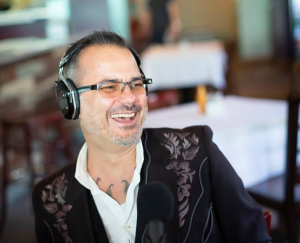
Damaged By Wind, Water and Spark…
For Dr. Dery and for the station’s committed volunteer staff, getting back on air became a singular focus. The station’s studio had suffered only minor damage but their transmitter had been fried.
Dr. Dery reports, “The location of our transmitter was either cooked because it was in a room where there was no air conditioner, or the other thought is that there was a brown out or there was an electrical something. What we realized is that our transmitter was dead.”
Nautel, the equipment manufacturer, notified the station, first, that repair would be a long-time coming as so many other stations were in similar situations and their crews were overbooked. Then came worse news: after examination of the transmitter, Nautel determined that it could not be repaired.
Dr. Dery and the WHIV staff considered their replacement alternatives. A new transmitter would cost thousands, and WHIV didn’t have the funds. A used one might be found, but that too was beyond their means. And, even when Nautel called one more time, to say that, well, yes, they could repair the station’s damaged equipment, the money to pay for that repair still wasn’t there.
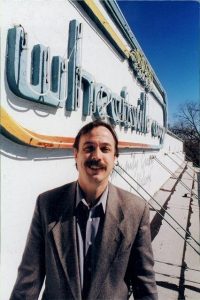
…And Rescued By Air
Then, Jim Ellinger called.
Austin Airwaves, Mr. Ellinger told Dr. Dery, was prepared to offer WHIV $2200, no strings attached. His organization had heard about WHIV’s dilemma and had taken it upon themselves to raise the money needed to put the station back on air.
Dr. Dery remembers his surprise.
“The next thing I know I’m getting a phone call from Jim Ellinger, who’s like, ‘hey this is who I am’ and this is kind of like the cavalry has come home, a knight just kind of descended out of the heavens. It was one of these like ‘AWHHHH.’ ‘I got money. I represent people who are into community radio stations.’ I’m like, ‘Really! There are people who like community radio? Get out of here! They want to give money to us? Get out of here! This is nothing that I know of.’
“And it was amazing. It was an incredible thing. The next thing you know we got checks coming in, and we were able to cover our expenses, to get the transmitter repaired plus other repairs at the station.”
By mid-November, WHIV was live. The timing, says Dr. Dery, was critical.
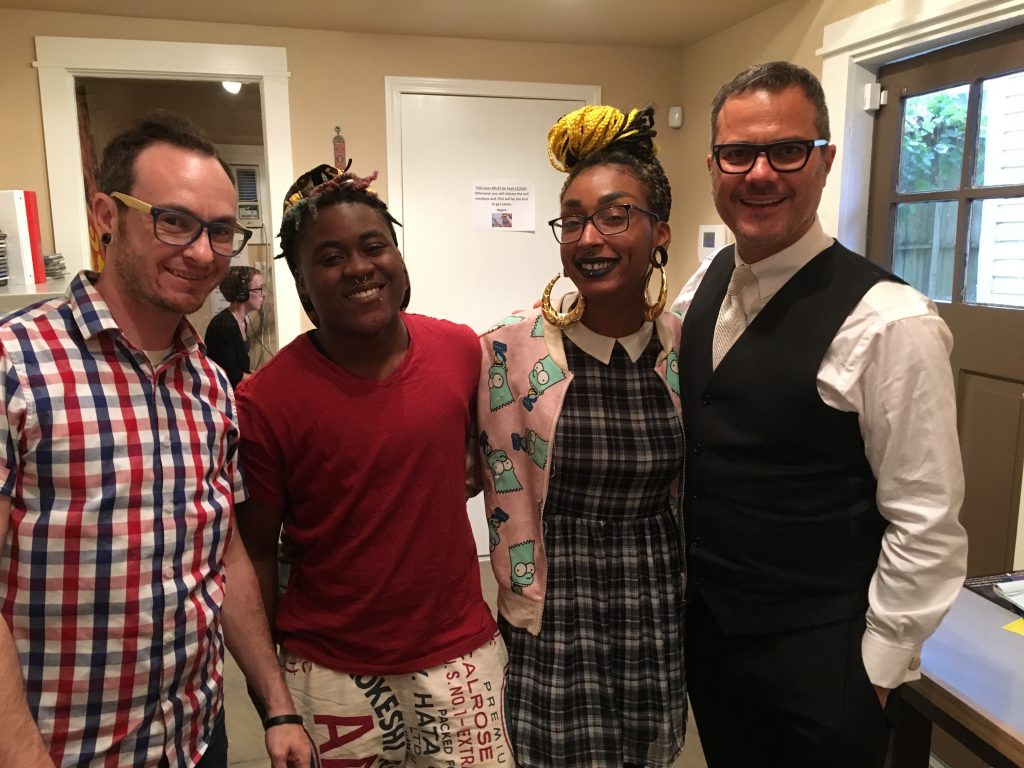
WHIV: Not a Station with a Mission, but a Mission with a Station
Launched on December 1, 2013, World Aids Day, as a station founded “to raise awareness about HIV and other infectious diseases through music,” WHIV saw the spread of covid in the first half of 2020 magnify the urgency of its broadcasts.
By May, WHIV was producing NoiseFilter, a 10-minute weekday program bringing accurate information about the virus to New Orleans.
“It was a surreal moment in our life in that we were off air,” Dr. Dery recalls. “We had the highest rates of [covid] cases…The radio station was used as a tool to make sure that the best information gets out there. I’m an infectious disease doctor, so by definition an expert in most things covid, so, at least here in New Orleans, people could always count on WHIV [to] hear the most up to date information…from me and different colleagues who were committed to making sure that we got the best information on air.”
And the spread of disinformation further amplified that need.
“We hear regularly,” says Dr. Dery, “from listeners, colleagues, fighting misinformation on covid, seeing the amount of disinformation that’s out there, and knowing that this disinformation spreads at six times the speed of real information.”
In fact, Dr. Dery reports, a few station hosts who questioned vaccines on air were “swiftly removed, no, ifs, ands or buts,” a discovery that led the station to create a sort of volunteer contract requiring respect for “the common science that is available at the time.”
These staffing concerns though, Dr. Dery emphasizes, are rare. Rather, he offers high praise for the station’s volunteer staff, a staff whose work allowed Dr. Dery to continue to practice medicine, even through the worst of the hurricane’s aftermath.
“Of course, the hospitals had power,” Dr. Dery says, “so I was able to wake up at home without any electricity or power, take a cold shower, put my scrubs on, go to the hospital for 12 hours, 13 hours and then after I was done then I would go and help the city run their free clinics….
“Thankfully, we have a really strong volunteer staff and people who really allow me to do the medical work. Our djs are amazing and the community we serve is amazing. The people at WHIV are volunteers. The djs and show hosts, their effort you can’t beat, can’t be appreciated enough for the work that they do.”
In coming to the station’s rescue, Austin Airwaves, Mr. Ellinger says, was, in part, motivated by the significance the station carries.
“Now, WHIV, even among community radio stations, is unique. There was a joke we heard that the FCC thought they would never issue the call letters HIV, let alone to a group called The Society for Infectious Disease [Awareness} headed up by this remarkable gentleman.”
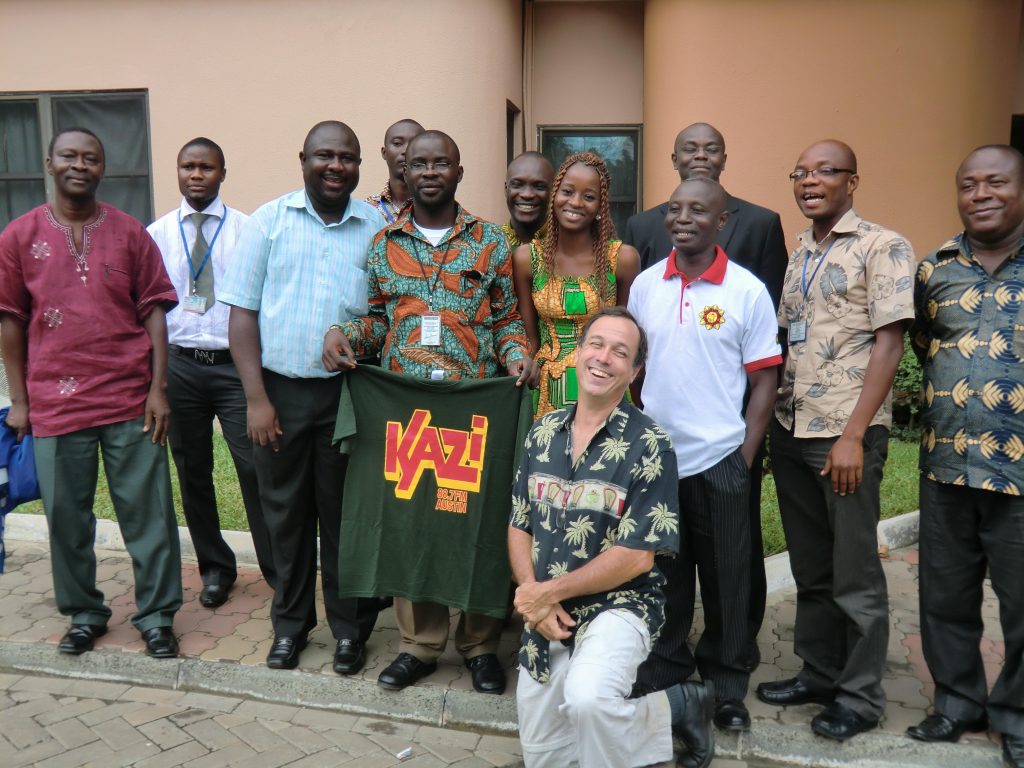
Austin Airwaves: Guardian of the Air
At Austin Airwaves, soaring rescue is simply what they do.
“We’re just a loose-knit collective of engineers, attorneys, radio activist-types who have a lot of experience in putting stations on the air and putting stations back on the air,” Mr. Ellinger explains. “We have our own resources, financial sources, and we typically wait to hear that a group is publically asking for help….We usually wait until a group announces that they were hit by a hurricane or an earthquake or a flood or we’ll see it on the numerous lists.”
Founded in 2008, Mr. Ellinger—who has a long history of work in community radio—explains that the idea grew out of his own disenchantment with the evolving management trends of a Texas station he had worked tirelessly to create.
Volunteering first in the 1970’s at Missouri’s KOPN, where he hosted a program focused on criminal and social justice issues, Mr. Ellinger, after moving to Austin in the early 1980’s, dedicated the next eleven years to putting KOOP on the air, only to find himself, in 1999, exiled from the station in a contentious administrative restructuring.
The disappointment of these events led Mr. Ellinger to conceive of an organization that would be dedicated, with no self-interest at play, to financing, building and supporting community radio across the country and around the world.…the perfect vehicle for paying forward with the generosity of spirit that had drawn Mr. Ellinger to community radio from the start.
“We still had the community radio bug,” Mr. Ellinger recalls, “and there’s a bunch of engineers and a whole lot of people in Austin who were very disenchanted with KOOP… So we sort of started over. We got a new 501(c)3 for Austin Airwaves dedicated to putting stations on the air in communities that needed a lot of progressive verbiage in the application, got the non-profit status and over the years have put stations on the air, sometimes in pretty dramatic form.”
This is work that has saved lives…a public safety station built in the Houston Astrodome for people from communities ravaged by Katrina; a station set up in Haiti just six weeks after the 2010 earthquake; a station created for Wimberley, Texas, after the town was devastated by flood; a solar-powered station started in Nditam, Cameroon, the remote community’s first station…and work that was recognized in 2017 when Mr. Ellinger received the Radio Pioneer Award.
Austin Airwaves’ accomplishments have in turn won the support of a network of generous donors.
“We do not do public fundraisers. We do not sell cupcakes. We do not sell t-shirts. We do not have events with bands….We did away with that model of fundraising years ago,” Mr. Ellinger explains. “We coalesce around a project, an individual project, and we just ask a group of—certainly under a hundred—serious benefactors and donors and say we’re taking on this project, cough up some cash….I probably know scores of lawyers and other left-leaning professionals in Austin, and they see me coming in their office and…say ‘how much for you to go away Ellinger,’ and ‘just $100 bucks; I’ll be out of here in a minute,’ ‘cut the guy $100 bucks,’ ‘ok, see you later, good bye.’”
Asked specifically about the organization’s ability to so quickly raise the funds needed by WHIV, Mr. Ellinger tells a story illustrative of how neatly the pieces of their work sometimes come together.
Years earlier, he recalls, the organization had retained a woman for a fee of $1,000 to write grants as part of an effort to establish a radio station in Fort Hood.
Then, Mr. Ellinger continues, “Well, lo and behold, years later, just a few months ago, I do this [WHIV] fundraising letter, and she says I’d like to give $1000 dollars. I said, ‘Really. Is there any connection there?’ ‘No, No. The $1000 dollars that you all gave me, which I know you had difficulty in raising, I want to give that $1000 dollars to the radio station.’ And that was a real pay-it-forward.”
These self-less actions, Mr. Ellinger reports, have been essential in sustaining his faith in community radio, despite the disenchantment of his earlier experience, reminders, he says, that, “I’m not the only dreamer, not the only guy to put his heart and soul into it for decades only to be tossed out with the recycling.”
Rather, he continues, “You got to do stuff because it’s the right thing to do. You got to stand up. You got to say no. You got to show up for the demonstration. You got to support the group that’s likely to fail. You got to do the hard work even if you get no recognition, right….But we’ve taken that perhaps one big step further. We expect no recognition….We just do this because community radio allows people to speak for themselves and to themselves.”
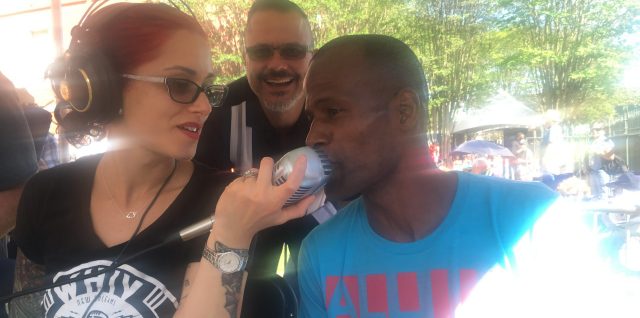
A Hive for the Honey Bee
Dr. Dery would agree.
In 2014, shortly after launching WHIV, Dr. Dery attended his first Grassroots Radio Conference in Iowa.
“And I remember,” he says. “Do you remember the video “No Rain” by the band Blind Melon, the little girl who was dressed as a bumble bee, and she was being made fun of everywhere, until, at the end of the video, she finds all the other people dressed like bumble bees dancing in the field. When I got to that Radio Conference, I always refer to it as my bumblebee moment, because that’s when I found my people. I always felt just considerably out of place and then I found my people. I called my wife up, and I was telling her, ‘This is my bumblebee moment. I found my people, Everyone else up here are bumblebees. This is good. We’re doing a good thing.’”
All photos used with permission of Dr. MarkAlain Dery and Jim Ellinger.

